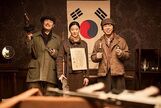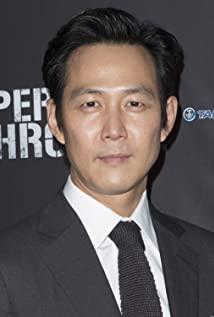Such a movie, of course, is "good-looking", and it is not boring at all for more than two hours.
Jun Ji Hyun's face, on the big screen, is beautiful no matter how you look at it.
It's a pity that Ha Zhengyu is so good at acting, but he only played a manga-like character. Chic is enough, but it always feels wasteful.
Their characters, placed in this anti-Japanese action movie full of the main theme and temperament, are not abrupt, and their personalities are also distinct, but after all, they are rigid. It seems that you can find similar shadows from thousands of movies of the same type.
On the contrary, it is Lian Shuojin, played by Lee Jung-jae, who unexpectedly has a hint of chewing.
In the movie, Lian Shuojin started out as an assassin of the resistance army, and he gave up his life and decided to assassinate a high-ranking Japanese military official.
The assassination failed, and Lian Shuojin was arrested. After being tortured, his desire for life surpassed the revolutionary ideal, and he surrendered to become a double agent.
His confrontation with the assassins has also become the main line that supports the entire film.
When it comes to resisting aggression, the topic of capitulation cannot be avoided. This is a scar that the invaders are ashamed to talk about but cannot escape.
During World War II, China's anti-Japanese army and millions of Chinese puppet troops fought fiercely in North China and Northeast China.
As an occupied country, Korea also has more than 100,000 volunteers with Japan to conquer all over the world.
Renegade, on the other hand, is an even more hated label. Not only because they have brought destructive damage to the resistance system, but also because their "betrayal" behavior may mentally shake and disintegrate the will of the rebels.
The reasons for betrayal include attachment to life, yearning for wealth and fame, and political setbacks and losses, or, just to make a gamble in front of the current situation.
Facing the former comrades, the traitors will also be more brutal than the aggressors, and will intensify their slaughter and persuade them to surrender. Perhaps they hope to use this method to destroy the self that once stood on the opposite side in exchange for inner peace, and to hide the despicableness of human nature through cruelty.
The more noble the opponent is, the more righteous and awe-inspiring, the more it sets off one's own humbleness and insignificance, this kind of unease will turn into jealousy, even hatred.
Only by proving them wrong can everything they do be justified.
Such self-anaesthesia also happened to Mr. Yi in Lust, Caution. He described to Wang Jiazhi in great detail how he tortured the arrested underground party, and then desperately used sex to escape everything from reality. In front of his naked lover, Mr. Yi, who is very shrewd, took off his mask, revealing a face as fragile as a child, and a deep lingering fear. This kind of fear, like drugs, only has more violence and sex. It can be relieved, but after all, there is no cure.
Therefore, even if the mission fails and his identity is exposed, even if he is disliked and abandoned by the Japanese authorities, Lian Shuojin in "Assassination" still follows the trail of the assassination group all the way, from Shanghai to Beijing (Seoul), and refuses to give up in the slightest. To completely destroy the assassination plan.
After Japan surrendered, Lian Shuojin still stated his revolutionary deeds in the court with justice and awe, and he not only escaped his guilt smoothly, but even received applause from the people.
The final retribution will of course come, although the bloody and procrastination, it still makes people feel happy.
Isn't the fate of the evil one what it should be?
However, the reality is not so.
The most embarrassing thing is Lian Shuojin's self-justification when facing An Woyun's questioning.
"I didn't expect Japan to lose either," he said.
Yes, if there was no Pearl Harbor, no Pacific War, and no U.S. participation in the war, and if the war was limited to a corner of Northeast Asia, Lian Shuojin might have become a role model. At least, under the protection of the legitimate regime, he can live the rest of his life with peace of mind.
Like the famous "Jinghai General" Shi Lang, he will be praised by later generations as a hero who maintains national unity and promotes national integration. He has erected monuments and statues in his hometown, and the scenery is infinite. He even made a big fanfare film called "General Shi Lang". "movie of.
As for the people who changed the dynasty, there will be a few people who will never forget it. What about their university scholar Hong Chengchou, who used to be the governor of Jiliao and the minister of military affairs in the former Ming Dynasty?
Justice or evil, right and wrong, just because of a small deflection of history, it has become a completely different appearance.
So even Lian Shuojin must be full of unwillingness and grievances in his heart.
They are just in the torrent of the times, accidentally, they have become the abandoned children of history.
They lost the bet.
Their unwillingness is not because of whether they are wrong, but because of why other people who have done wrong have different endings?
What a ridiculous irony.
I often think of that handsome young man with high spirits in 1910, in the turbulent era.
He threw himself into the revolution and failed to assassinate the Manchu Regent Zaifeng. He was imprisoned and was about to be executed.
In prison, he wrote a generous verse, "Let the sword be fast, and live up to the boy's head", which he recited for the world.
At that time, he was only 26 years old.
At that time, his name was Wang Zhaoming.
Later, he had a more widely known name - Wang Jingwei.
View more about Assassination reviews











